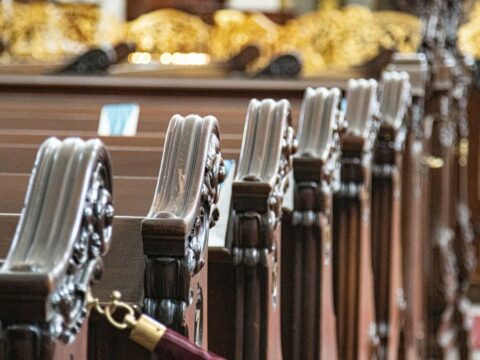It’s community prayer time at West Hill United, and a microphone is being passed from hand to hand between the pews. Overhead, colourful streamers resembling a rainbow dangle wistfully, nearly concealing a cross on the wall beyond. A few of the 50 or more people packed into the church on a November Sunday seem to bare all during this time: one offers a prayer for the quashed federal climate change bill, and another remembers a neighbour who has hurt her ankle. A woman stands up to share her battle with depression and reveals she’s been going through a dark stage in her life. “I just ask that I be kept in your thoughts and prayers,” she says, her voice fragile but clear in the Scarborough, Ont., sanctuary.
She wasn’t asking for God’s strength or for a miracle. West Hill identifies itself as a post-theistic congregation, one that does not believe in a supernatural being or an interventionist, capital “G” God, but rather in the sacredness inherent in leading a life of justice and love. And so the woman’s plea was met with “May love abound,” a blessing spoken in unison by the people around her.
You may unsubscribe from any of our newsletters at any time.
Post-theism has quietly emerged in individual United Church ministries across Canada that desire a sense of intellectual satisfaction and nurturing and inspiration in their spiritual lives, qualities they say the traditional format fails to offer. Post-theistic churches use the Bible sparingly, acknowledging its contents as myth — or don’t reference it at all. Many write their own music, use contemporary songs to convey their values or change the lyrics to familiar tunes. Prayers aren’t addressed to God, but to the community and its innate sacredness.
This approach has attracted people who haven’t found what they’re looking for in traditional sanctuaries, ministers say. But it’s turned away congregants who feel they can no longer access their faith without the traditional symbols and language.
West Hill’s shift to post-theistic worship began in 2001 when the Board decided to gradually shed the word “God,” says Rev. Gretta Vosper, the minister of West Hill and author of With or Without God: Why the Way We Live Is More Important than What We Believe. “In the United Church, we’re very strong about praying for guidance, praying for strength, praying for courage, and if you take that idea of an interventionist God . . . away, nothing has really changed,” she says. “You’re still asking for strength, except it’s not coming from some supernatural source. It comes from the community that you gather with.”
West Hill’s community first shrank and then grew after Vosper’s book was published in 2008. About a third of the congregation left in the months after it hit bookshelves, she says, including some Board members who had earlier pushed for a non-traditional direction. New Board members are eager to further the church’s journey into post-theism, and the church has come to be primarily led by the congregation itself, she says.
One such example was a member’s suggestion to remove the cross from the sanctuary while workers replaced lighting. “I said, ‘Wait a minute, that’s not my mandate. I’m not keen on taking the cross down,’” Vosper recalls. “Really, I’m not pushing [post-theism] anymore. Now it’s the congregation that’s taken hold in how changes take place.”
Last December, West Hill United decided to forego its usual Christmas Eve service and instead celebrated “The Longest Night” on Dec. 21, the winter solstice. The new service was to focus on “hope and anticipation,” according to an early December press release, “two features of both the ancient recognition of the sun’s return and the more recent Christmas story.”
The congregation is also having more conversations about spirituality, Vosper says, which makes for a much more interactive service. It’s a change from back in 2001 when she discovered through her research that church people had difficulty articulating their beliefs.
Rev. Ken Gallinger, who leads the congregation at Lawrence Park Community Church in north Toronto, says people are coming to Sunday worship there because they feel free to explore deeper questions and discuss some of their conflicting feelings about what they’ve traditionally been taught. “We hear so much about why people are not in our churches these days — that people are busy and they’re going to hockey, etc. But underneath that is a more fundamental thing: they don’t believe it,” he says. “What we’re trying to create here is a safe place for people to talk about ‘How do we develop an authentic spirituality without a guy in the sky?’”
Gallinger still uses what he calls “God language” in church, but it’s used as “poetry, not prose.” At a November service, the Lord’s Prayer was played on the piano, unaccompanied by lyrics. A passage from Isaiah was read. But following a Johnny Cash and June Carter song played as part of his sermon, Gallinger reminded people that the song’s storyline — a deceased loved one makes sandcastles in heaven while waiting for her dearest to arrive — is complete mythology.
“Of course I don’t believe that — that’s foolish and ridiculous,” he tells them. “We know too much about the world to not know that isn’t true.”
Because post-theistic views are still emerging, being a post-theistic church can be isolating. Vosper says some of her congregants can’t sit through Presbytery worship services because they’re no longer comfortable listening to God language. Gallinger tells of how his congregation raised all the capital for a new church with little to no help from The United Church of Canada.
“They’re completely uninterested in us,” he says. “We’re just doing what we’re doing, and we’re trying to live that as a congregation. The United Church of Canada is doing whatever it’s doing.”
Privately, churches hint that the institution is threatened by new ideas, new approaches to faith. But Rev. Robert Dalgleish, the General Council’s executive director of the network for ministry development, says that’s simply not the case. “I don’t think it’s a threat,” he says. “The threat to the truth is to shut down the conversation. If we’re open to the conversation, we don’t need to worry about losing the truth. In fact, we’re more open to finding it.”
He sees post-theistic congregations as just one among many emerging forms of ministry within the United Church, which include into-the-community ministries like the café ministry in Hamilton or the skate-park ministry in Perth, Ont. “We have been so insular that the vigorousness and provocativeness of conversations like this are healthy for us if they’re going to get us thinking out of the box,” he says.
Southminster-Steinhauer United in Edmonton has always taken a liberal approach to ministry, and their recent move toward “expansive Christianity” has been part of a natural evolution, says Rev. Nancy Steeves. In 2008, she surveyed her congregation about their beliefs and found 62 percent of respondents didn’t believe in God as a person-like being and that the majority came to church because they wanted to be inspired and thoughtful about their spiritual lives.
“[The survey findings] allowed some folks to come out of the closet theologically,” she says. “People didn’t feel so alone, and they also felt a freedom to talk to each other about their faith and to express things differently.”
Steeves thinks more could be done to spread the word about expansive Christianity, post-theistic thought and the mandates of many churches to keep inspiration and intellect at the core of their gatherings. “We haven’t done a good job in communicating that it isn’t just ‘church as usual’ to a constituency who would find what we offer to be extensive and relevant to their lives,” she says. “[They need to] trust that they wouldn’t walk through the doors and everything looks like it did in the 1960s, [with the congregation] singing Holy, Holy, Holy and talking about things that are not relevant to them.”
This story first appeared in The Observer’s February 2011 issue with the title “Sacred, yes. But is it church?”













